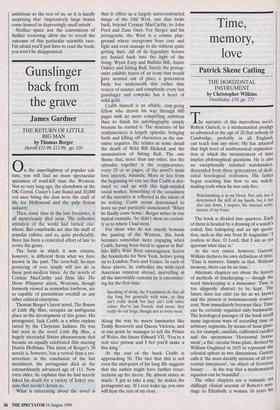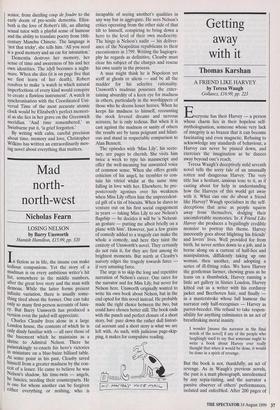Time, memory, love
Patrick Skene Catling
THE HORIZONTAL INSTRUMENT by Christopher Wilkins Doubleday, £10, pp. 272 The narrator of this marvellous novel, Robert Garrett, is a mathematical prodigy so advanced at the age of 20 that nobody in Cambridge, probably in all England, can teach him any more. He has attained that high level of mathematical sophistica- tion at which the measurement of time implies philosophical questions. He is also an exceptionally talented watchmaker, descended from three generations of dedi- cated horological craftsmen. His father began teaching him how to use watch- making tools when he was only five.
Watchmaking is in my blood. Not only has it determined the skill of my hands, but it has also laid down, I suspect, the internal archi- tecture of my brain.
The book is divided into quarters. Each of them is headed by a drawing of a watch's coiled, fine hairspring and an apt quota- tion, such as this one from St Augustine: `1 confess to thee, 0 Lord, that I am as yet ignorant what time is.' At the very outset, however, Garrett/ Wilkins declares his own definition of time `Time is memory. Simple as that. Without memory, there can be no time.'
Alternate chapters are about the history of methods of timekeeping — though the word timekeeping is a misnomer. Time is too slipperily abstract to be kept. The future does not exist (as far as we knoW) and the present is instantaneously evanes- cent. Now immediately becomes then. Time can be certainly regarded only backwards. The horological passages of the book recall many ingenious ways of recording time in arbitrary segments, by means of hour-glass- es, for example, sundials, calibrated candles and the eponymous 'Horizontal Instru- ment', a flat, circular brass plate, devised by William Oughtred in 1635 to represent the celestial sphere in two dimensions. Garrett calls it 'the most durably accurate of all ter- restrial timepieces', 'an object of ferocious beauty . . . in the way that a mathematical equation can be beautiful'. The other chapters are a romantic yet chillingly clinical account of Robert's mat:- rine to Elizabeth, a woman 16 years his senior, from dazzling coup de foudre to the early doom of pre-senile dementia. Eliza- beth is the love of Robert's life, an alluring sexual tutor with a playful sense of humour and the ability to translate poetry from 18th- century Manchu Chinese. The language is `not that tricky', she tells him. 'All you need is a good memory and an ear for intonation.'
Dementia destroys her memory, her sense of time and awareness of his and her own identities. The idyll becomes a night- mare. When she dies (it is on page five that we first learn of her death), Robert resolves to make 'a watch in which natural imperfections of every kind would conspire to create a flawless instrument'. A watch in synchronisation with the Coordinated Uni- versal Time of the most accurate atomic clock would be Elizabeth's perfect memori- al as she lies in her grave on the Greenwich meridian. 'And time remembered,' as Swinburne put it, 'is grief forgotten.'
By writing with calm, careful precision about time, memory and love, Christopher Wilkins has written an extraordinarily mov- ing novel about everything that matters.



























































 Previous page
Previous page